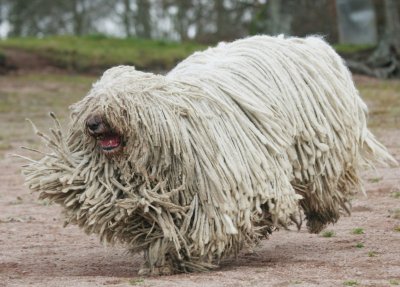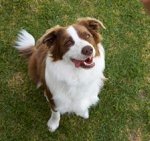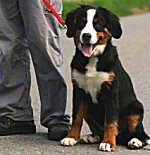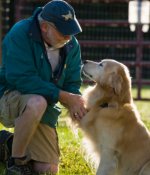Komondors: What's Good About 'Em, What's Bad About 'Em
Komondor temperament, personality, training, behavior, pros and cons, advice, and information, by Michele Welton, Dog Trainer, Behavioral Consultant, Author of 15 Dog Books

Although energetic and playful as a puppy, the Komondor matures into a serious, dignified, self-reliant adult at two or three years of age.
Though calm and quiet indoors, he is emphatically not suited to an apartment. His ideal environment is a large home with a spacious and securely fenced yard, in the country without close neighbors. Komondors have a deep, impressive bark which they tend to use freely, especially at night when they are most attentive.
Selflessly devoted to his family and distrustful of strangers, some Komondors are never completely comfortable with any outsider. Indeed, most Komondors must be carefully introduced to guests, then supervised while the guest is present in the home.
Despite his bulk and heavy coat, the Komondor is remarkably agile and reacts very, very quickly. Early and ongoing socialization are essential if his territorial instincts are to remain controlled rather than indiscriminate.
The Komondor is patient with his own family's children, but can be overprotective when neighborhood kids join in. Similarly, he may be protective of his own family's pets while aggressively attacking others.
Livestock guardians were expected to keep watch and make their own decisions and that is exactly what the Komondor does. His instincts to trust his own judgment are very strong. Unless you establish yourself as the leader (number one), no one will really have control over him.
Frankly, most Komondors are "too much dog" for the average household. This is a serious working dog with tremendous strength, and very few people can really provide the home or lifestyle that keeps this breed satisfied.
If you want a dog who...
- Is large, shaggy (unless clipped short), and imposing-looking
- Will protect your horses, llamas, sheep, goats, and chickens
- Is steady and dependable, rather than playful
- Is protective of his home and family
- Needs only moderate exercise
A Komondor may be right for you.
If you don't want to deal with...
- Providing something for this working dog to do (guarding livestock is best)
- Massive destructiveness when bored
- Suspiciousness toward strangers
- Aggression toward animals who don't belong to his family
- Providing six-foot fences and lots of supervision to prevent wandering
- Strong-willed mind of his own, requiring a confident owner who can take charge
- Deep booming barks, especially at night when he hears a sound
- LOTS of grooming (unless clipped short)
- "Shaggy dog syndrome," i.e. debris clinging to the coat, water soaking into the beard and dripping on your floors
A Komondor may not be right for you.
 |
Dog Breed Traits – Which Traits Are Right For You? In this brand new series, I'll help you decide which dog breed traits would best suit you and your family, your home and yard, and your lifestyle, so you can choose the best dog breed for your family. |
Keep in mind that the inheritance of temperament is less predictable than the inheritance of physical traits such as size or shedding. Temperament and behavior are also shaped by raising and training.
FREE eBooks by Michele Welton
![]() "Respect Training for Puppies" and "Teach Your Dog 100 English Words" are free step by step guides to teaching your pup to be calm and well-behaved.
"Respect Training for Puppies" and "Teach Your Dog 100 English Words" are free step by step guides to teaching your pup to be calm and well-behaved.
![]() "11 Things You Must Do Right To Keep Your Dog Healthy and Happy" is a free guide to keeping your dog mentally, physically, and emotionally happy and healthy so you can enjoy a longer lifetime of companionship.
"11 Things You Must Do Right To Keep Your Dog Healthy and Happy" is a free guide to keeping your dog mentally, physically, and emotionally happy and healthy so you can enjoy a longer lifetime of companionship.

More traits and characteristics of the Komondor
If I was considering a Komondor, I would be most concerned about...
- Providing something worthwhile to do. The Komondor is most satisfied when guarding livestock. You can substitute pulling a cart or sled, or backpacking, but without something constructive to do, a Komondor is likely to become bored and destructive.
- Providing enough socialization. Komondors need extensive exposure to friendly people so they learn to recognize the normal behaviors of "good guys." Then they can recognize the difference when someone acts abnormally. Without careful socialization, they may be suspicious of everyone.
- Potential animal aggression. Most Komondors will treat the pets in their own family as members of their flock. But they have strong instincts to drive away animals who do not belong to their family. Many Komondors are dominant or aggressive toward dogs they don't know. Some Komondors are not safe with cats. This powerful breed is capable of seriously injuring or killing other animals.
- Grooming. If you want your Komondor to look anything like the pictures in dog books and on TV, you'll be spending an enormous amount of time and energy in coat care. The wiry hairs of his outer coat tend to fuse with the wooly hairs of his undercoat to form felt cords. If you wish to keep this appearance, you should separate the cords every few weeks. Bathing takes an hour, for the cords must be thoroughly rinsed. Drying takes at least 24 hours, assisted by a dryer and box fans. Your second option is to brush out the cords whenever they start to form. This produces a natural "shaggy" look that simply requires lots of regular brushing and combing.
For the easiest coat of all, you should trim or clip the coat so it's short and sanitary. I think a short clipped coat looks great!
- "Shaggy dog syndrome." Like all shaggy dogs, the Komondor is a messy dog. Leaves, mud, snow, fecal matter, and other debris cling to his rough coat and ends up all over your house. When he drinks, his beard absorbs water, which drips on your floors when he walks away. When he eats, his beard absorbs food so that when he sniffs your face or presses his head against your leg, YOU end up dirty, too. Big shaggy dogs are not suited to fastidious housekeepers.
Once again, you can make things easiest for you and the dog by keeping his coat short.
- The strong temperament. As flock guardians, Komondors are bred to have an independent mind of their own so they can protect their vulnerable charges from whatever danger appear. They prefer to make their own decisions, which may not line up with yours when you're trying to raise them as an indoor companion. In other words, Komondors are typically willful dogs. You must show them, through absolute consistency, that you mean what you say. Follow my free online training programs.
- Noise. Unless you live on a farm away from close neighbors, Komondors should never be left outside unsupervised. Their booming barks will have your neighbors calling the cops to report the nuisance.
Hopefully you have come to the sensible conclusion that the Komondor is not suited to most households. Only specific living situations can provide the activities that keep him most satisfied.
My best-selling books – now available FREE on my website
 Respect Training For Puppies: 30 seconds to a calm, polite, well-behaved puppy is for puppies 2 to 18 months old. Your puppy will learn the 21 skills that all family dogs need to know. Click here to read for free.
Respect Training For Puppies: 30 seconds to a calm, polite, well-behaved puppy is for puppies 2 to 18 months old. Your puppy will learn the 21 skills that all family dogs need to know. Click here to read for free. Teach Your Dog 100 English Words is a unique Vocabulary and Respect Training Program that will teach your adult dog to listen to you and do what you say. Click here to read for free.
Teach Your Dog 100 English Words is a unique Vocabulary and Respect Training Program that will teach your adult dog to listen to you and do what you say. Click here to read for free. 11 Things You Must Do Right To Keep Your Dog Healthy and Happy helps your dog live a longer, healthier life. Get my honest advice about all 11 Things before you bring home your new puppy, because some mistakes with early health care cannot be undone. Click here to read for free.
11 Things You Must Do Right To Keep Your Dog Healthy and Happy helps your dog live a longer, healthier life. Get my honest advice about all 11 Things before you bring home your new puppy, because some mistakes with early health care cannot be undone. Click here to read for free.Related posts you might enjoy






